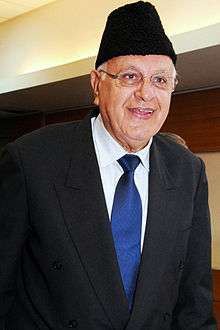Jammu and Kashmir Legislative Assembly election, 2002
| ||||||||||||||||||||||||||||||||||||||||||||||||||||||
all 87 seats in Legislative Assembly 44 seats needed for a majority | ||||||||||||||||||||||||||||||||||||||||||||||||||||||
| Turnout | 45% | |||||||||||||||||||||||||||||||||||||||||||||||||||||
| ||||||||||||||||||||||||||||||||||||||||||||||||||||||
| ||||||||||||||||||||||||||||||||||||||||||||||||||||||
Elections for the Indian state of Jammu and Kashmir were held in September -October 2002 in four phases.[1][2] Mufti Mohammad Sayeed became Chief Minister of Jammu Kashmir after the elections.[3] In 2005 under a coalition agreement INC's Ghulam Nabi Azad became Chief Minister. He was the first Indian National Congress party Chief Minister of Jammu and Kashmir.[4] In reaction terrorist group Jaish-e-Mohammad had conducted a suicide car bomb attack in Srinagar killing six people just hours before Azad's swearing-in.[5] Panthers Party formed part of the ruling coalition with Harsh Dev Singh becoming the party's first cabinet minister.[6]
Electronic Voting Machines were used for first time in Jammu Kashmir assembly elections in 2002.[7] The international community also appreciated the credibility of the elections and the results that followed it. The elections was seen as a victory of the ballot over the bullet.[8][9] United States lauded 2002 elections of the state.[10][11] There were 1.7 million voters in the state for 2002 elections.[12][13]
Voting
The first phase voting took place on 16 September 2002.[14] There was a polling station for just 11 voters in Zanskar.[7] BJP contested on 52 seats while Jammu State Morcha contested on 12 seats.[15][16] National Conference president Omar Abdullah contested from Ganderbal seat.[17] Separatists had varied views on the elections ranging from voting to boycott of elections.[18][19][20]
Results
The four stages of the elections were held as follows:

| Date | Seats | Turnout | |
|---|---|---|---|
| Monday 16 September | 23 | 47.28% | |
| Sunday 24 November | 28 | 42% | |
| Sunday 1 October | 5 | 41% | |
| Sunday 8 October | 18 | 46% | |
| Total | 87 | 45% | |
| Source:[21] | |||
References
- ↑ J&K election in four phases on Sep 16, 24, Oct 1, 8
- ↑ 2002 J&K Assembly elections
- ↑ http://www.jammu-kashmir.com/insights/insight20021030.html
- ↑ Hussain, Aijaz (14 November 2005). "Ghulam Nabi Azad becomes first Congress CM of Jammu & Kashmir in 30 years". India Today. Retrieved 2016-11-12.
- ↑ "BBC NEWS | South Asia | Suicide bomber hits Kashmir city". BBC. 2 November 2005. Retrieved 2016-11-12.
- ↑ "Sayeed sworn-in as J&K chief minister". Rediff. 2 November 2002. Retrieved 2016-11-12.
- 1 2 Polling station for just 11 voters in Zanskar constituency
- ↑ 47.2% polling recorded in first phase of J&K poll
- ↑ 44 per cent turnout in 1st phase of J&K polls
- ↑ Infiltration across LoC has increased: US
- ↑ United States lauded 2002 elections
- ↑ J&K electoral rolls not '100 per cent accurate'
- ↑ Sonia calls for a 'final solution' to Kashmir problem
- ↑ Militants attack school in Udhampur, 2 killed
- ↑ BJP to contest 52 seats in J&K
- ↑ Discuss J&K problem only with elected representatives: BJP
- ↑ Omar Abdullah files nomination papers from Ganderbal
- ↑ Hurriyat has told supporters to vote against National Conference
- ↑ Shabbi Shah boycott
- ↑ J&K polling figure rises by over 3 per cent
- ↑ 7-phase poll in J&K from November 17, Rediff India, 2008-10-19, accessed on 2008-12-30



